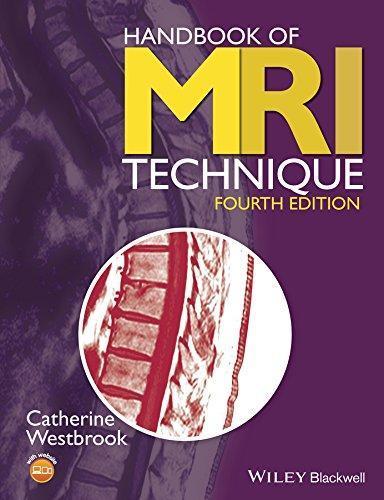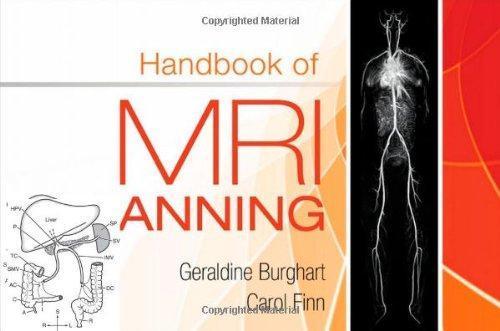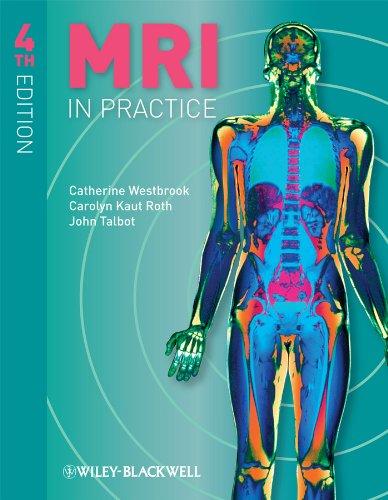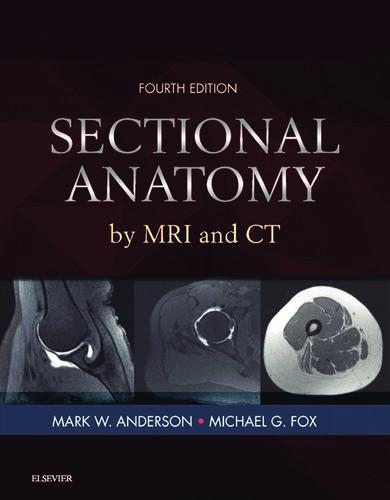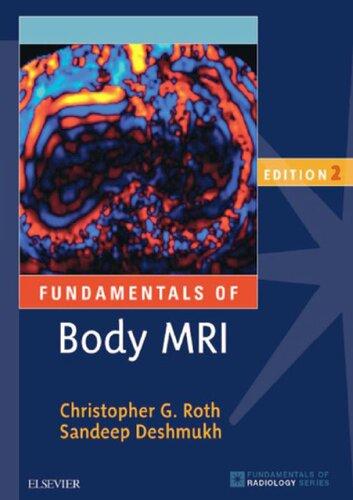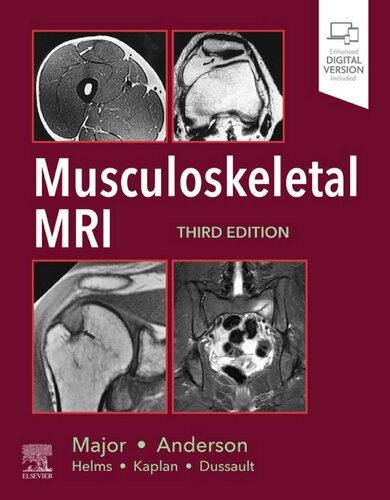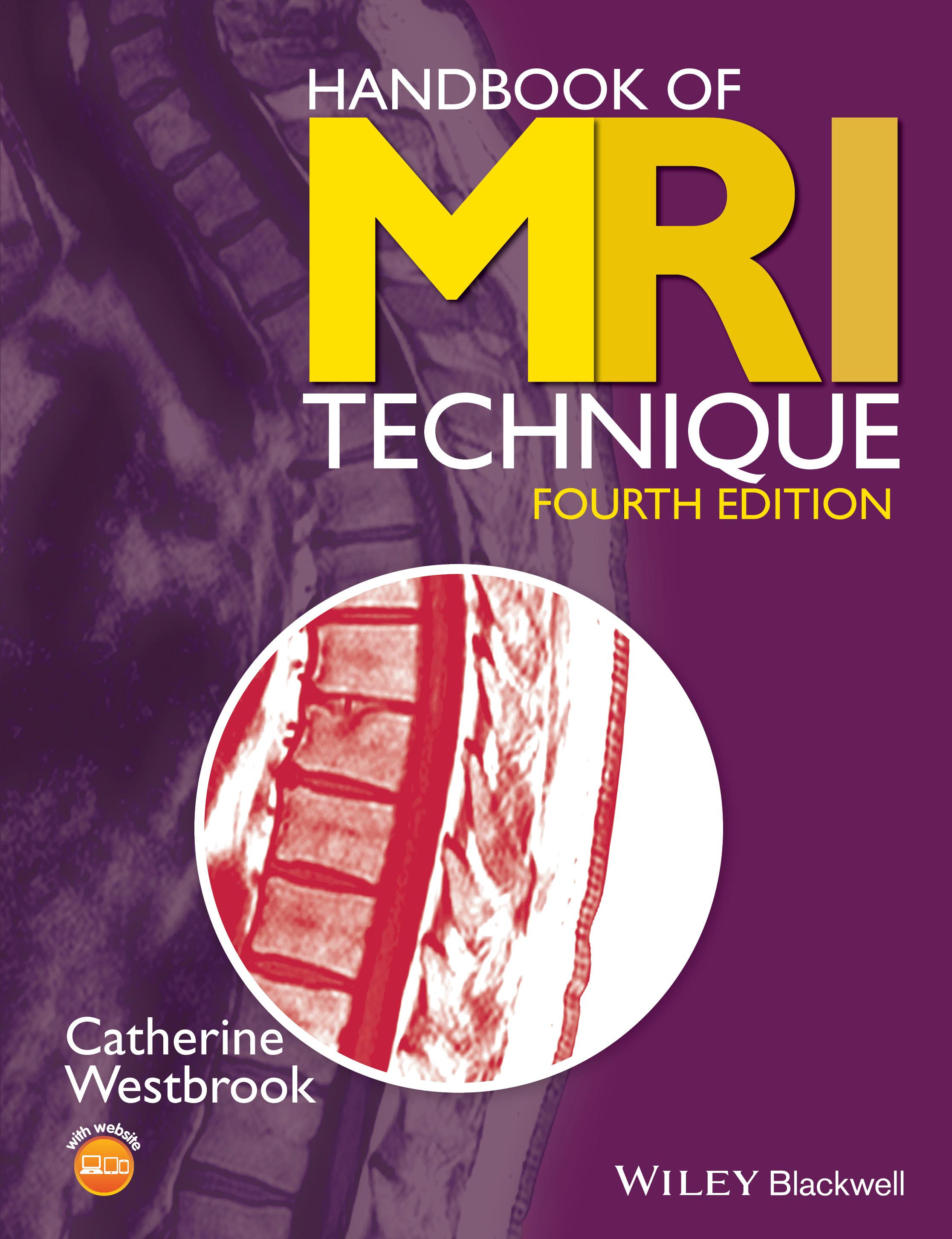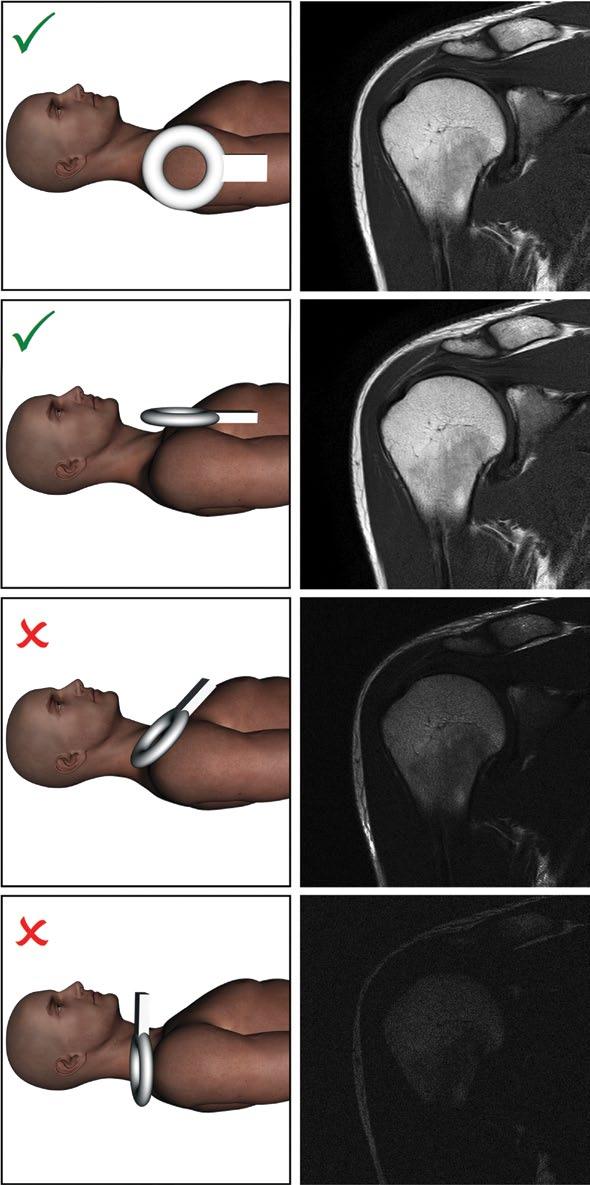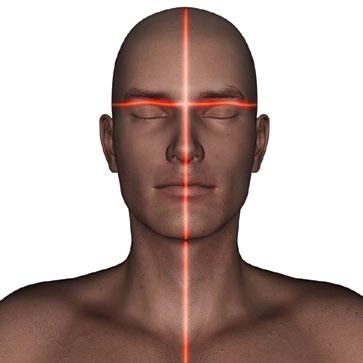How to use this book
Introduction
This book has been written with the intention of providing a step-by-step explanation of the most common examinations currently carried out using magnetic resonance imaging (MRI). It is divided into two parts.
Part 1 contains reviews or summaries of those theoretical and practical concepts that are frequently discussed in Part 2. These are:
• parameters and trade-offs
• pulse sequences
• flow phenomena and artefacts
• gating and respiratory compensation (RC) techniques
• patient care and safety
• contrast agents.
These summaries are not intended to be comprehensive but contain only a brief description of definitions and uses. For a more detailed discussion of these and other concepts, the reader is referred to the several MRI physics books now available. MRI in Practice by C. Westbrook, C. Kaut Roth and John Talbot (Wiley Blackwell, 2011, fourth edition) describes them in more depth.
Part 2 is divided into the following examination areas:
• head and neck
• spine
• chest
• abdomen
• pelvis
• upper limb
• lower limb.
Each anatomical region is subdivided into separate examinations. For example, the section entitled Head and Neck includes explanations on
Handbook of MRI Technique, Fourth Edition. Catherine Westbrook. © 2014 John Wiley & Sons, Ltd. Published 2014 by John Wiley & Sons, Ltd. Companion website: www.wiley.com/go/westbrook/mritechnique
imaging the brain, temporal lobes, pituitary fossa, etc. Under each examination, the following categories are described:
• basic anatomy
• common indications
• equipment
• patient positioning
• suggested protocol
• image optimization
• patient considerations
• contrast usage.
Basic anatomy
Simple anatomical diagrams are provided for most examination areas to assist the reader.
Common indications
These are the most usual reasons for scanning each area, although occasionally some rarer indications are included.
Equipment
This contains a list of the equipment required for each examination and includes coil type, gating leads, bellows and immobilization devices. The correct use of gating and RC is discussed in Part 1 (see Gating and respiratory compensation techniques). The coil types described are the most common currently available. These are as follows.
• Volume coils that both transmit and receive radio-frequency (RF) pulses and are specifically called transceivers. Most of these coils are quadrature coils, which means that they use two pairs of coils to transmit and receive signal, so improving the signal to noise ratio (SNR). They have the advantages of encompassing large areas of anatomy and yielding a uniform signal across the whole field of view (FOV). The body coil is an example of this type of coil.
• Linear phased array coils consist of multiple coils and receivers. The signal from the receiver of each coil is combined to form one image. This image has the advantages of both a small coil (improved SNR) and those of the larger volume coils (increased coverage). Therefore linear phased array coils can be used either to examine large areas, such as the entire length of the spinal cord, or to improve signal uniformity and intensity in small areas such as the breast. Linear phased array coils are commonly used in spinal imaging.
• Volume phased array (parallel imaging) uses the data from multiple coils or channels arranged around the area under examination to either decrease scan time or increase resolution. Additional software and hardware are required. The hardware includes several coils perpendicular to each other or one coil with several channels. The number of coils/channels varies but commonly ranges from 2 to 32. During acquisition, each coil fills its own lines of k-space (e.g. if two coils are used together, one coil fills the even lines of k-space and the other the odd lines. k-space is therefore filled either twice as quickly or with twice the phase resolution in the same scan time). The number of coils/channels used is called the reduction factor and is similar in principle to the turbo factor/echo training length (ETL) in fast spin echo (FSE) (see section on Pulse sequences in Part 1). Every coil produces a separate image that often displays aliasing artefact (see section on Artefacts in Part 1). Software removes aliasing and combines the images from each coil to produce a single image. Most manufacturers offer this technology, which can be used in any examination area and with any sequence.
• Surface/local coils are traditionally used to improve the SNR when imaging structures near to the skin surface. They are often specially designed to fit a certain area and, in general, they only receive signal. RF is usually transmitted by the body coil when using this type of coil. Surface coils increase SNR compared with volume coils. This is because they are placed close to the region under examination, thereby increasing the signal amplitude generated in the coil, and noise is only received in the vicinity of the coil. However, surface coils only receive signal up to the edges of the coil and to a depth equal to the radius of the coil. To visualize structures deep within the patient, either a volume, linear or volume phased array coil or a local coil inserted into an orifice must be utilized (e.g. a rectal coil).
The choice of coil for any examination is one of the most important factors that determine the resultant SNR of the image. When using any type of coil remember to:
• Check that the cables are intact and undamaged.
• Check that the coil is plugged in properly and that the correct connector box is used.
• Ensure that the receiving side of the coil faces the patient. This is usually labelled on the coil itself. Note: Both sides of the coil receive signal, but coils are designed so that one side receives optimum signal. This is especially true of shaped coils that fit a certain anatomical area. If the wrong side of the coil faces the patient, signal is lost and image quality suffers.
• Place the coil as close as possible to the area under examination. The coil should not directly touch the patient’s skin as it may become warm during the examination and cause discomfort.
A small foam pad or tissue paper placed between the skin surface and the coil is usually sufficient insulation.
• Ensure that the coil does not move when placed on the patient. A moving coil during acquisition means a moving image!
• Always ensure that the receiving surface of the coil is parallel to the Z (long) axis of the magnet. This guarantees that the transverse component of magnetization is perpendicular to the coil and that maximum signal is induced. Placing the coil at an angle to this axis, or parallel to the X or Y axis, results in a loss of signal (Figure 1.1).
Patient positioning
This contains a description of the correct patient position, placement of the patient within the coil and proper immobilization techniques. Centring and land-marking are described relative to the laser light system as follows (Figure 1.2):
• The longitudinal alignment light refers to the light running parallel to the bore of the magnet in the Z axis.
• The horizontal alignment light refers to the light that runs from left to right of the bore of the magnet in the X axis
• The vertical alignment light refers to the light than runs from the top to the bottom of the magnet in the Y axis.
It is assumed in Part 2 that the following areas are examined with the patient placed head first in the magnet:
• head and neck (all areas)
• cervical, thoracic and whole spine
• chest (all areas)
• abdomen (for areas superior to the iliac crests)
• shoulders and upper limb (except where specified).
The remaining anatomical regions are examined with the patient placed feet first in the magnet. These are:
• pelvis
• hips
• lower limbs.
Suggested protocol
This is intended as a guideline only. Almost every centre uses different protocols depending on the type of system and radiological preference. However, this section can be helpful for those practitioners scanning without a radiologist, or where the examination is so rare that perhaps
Figure 1.1 Correct placement of a flat surface coil in the bore of the magnet. The surface of the coil (shaded) area must be parallel to the Z axis to receive signal. The coil is therefore positioned so that transverse magnetization created in the X and Y axes is perpendicular to the coil.
Vir tually no signal
(d)
(c)
(b)
(a)
Lower SNR
High SNR
High SNR
Coil position
neither the radiologist nor the practitioner knows how to proceed. The protocols given are mainly limited to scan plane, weighting, suggested pulse sequence choices and slice positioning.
It must be stressed that all the protocols listed are only a reflection of the authors’ practice and research, and are in no way to be considered the law!
If all your established protocols are satisfactory, this section is included for interest only. If, however, you are unfamiliar with a certain examination, the suggested protocol should be useful.
Occasionally in this section coordinates for slice prescription are given in bold type in millimetres (mm) where explicit prescription can be utilized (mainly for localizers). Graphic prescription coordinates cannot be given as they depend on the exact position of the patient within the magnet and the region of interest (ROI). The explicit coordinates are always given as follows:
• Left to Right L to R
• Inferior to Superior I to S
• Posterior to Anterior P to A.
In the suggested protocols, a certain format is adopted when some parameters remain constant and others change. For example, in the protocol for a coronal spin echo (SE), proton density (PD)/T2 sequence of the brain the text reads.
Coronal SE/FSE PD/T2
As for axial PD/T2, except prescribe slices from the cerebellum to the frontal lobe.
Figure 1.2 Positioning of the alignment lights.
This indicates that the pulse sequence, timing parameters, slice thickness and matrix are the same as the axial except the slices are prescribed through a different area. This format is intended to avoid repetition. In most examinations, there is a section reserved for additional sequences. These are extra sequences that we do not regard as routine but may be included in the examination. Of course, some practitioners may regard what we call ‘additional’ as ‘routine’, and vice versa.
Image optimization
This section is subdivided into:
• Technical issues
• Artefact problems
Technical issues: This includes a discussion of the relationship of SNR, spatial resolution and scan time pertaining to each examination. Suggestions on how to optimize these factors are described (see Parameters and trade-offs in Part 1). The correct use of pulse sequences and various imaging options are also discussed (see also Pulse sequences in Part 1).
Artefact problems: This contains a description of the common artefacts encountered and ways in which they can be eliminated or reduced (see also Flow phenomena and artefacts in Part 1).
Patient considerations
This encompasses the condition of the patient, including symptoms and claustrophobia. Suggestions to overcome these are given (see also Patient care and safety in Part 1).
Contrast usage
The reasons for administering contrast in each particular area are discussed. Again, contrast usage varies widely according to radiological preferences. This section is a guideline only (see also Contrast agents in Part 1).
Follow this 10-point plan for good radiographic practice:
1. Review all cases carefully and select appropriate protocols.
2. Have flexible protocols that can reflect the needs of each individual clinical case.
3. Regularly review your procedures and benchmark them against current best practice.
4. Have clear diagnostic goals including the minimum accepted sequences necessary to obtain a useful diagnostic/clinical outcome.
5. Regularly review your protocols and procedures.
Another random document with no related content on Scribd:
sacred meteor: ‘No more, no more delay from me. I follow your guidance, and am already in the way by which you would lead me. Gods of my country! preserve my house, preserve my grandchild. Yours in this augury your shield is stretched over Troy. Yes, my son, I 30 give way, and shrink not from accompanying your flight.’ He said—and by this the blaze is heard louder and louder through the streets, and the flames roll their hot volumes nearer. ‘Come then, dear father, take your seat on my back, my shoulders shall support you, nor shall I feel the 35 task a burden. Fall things as they may, we twain will share the peril, share the deliverance. Let my little Iulus walk by my side, while my wife follows our steps at a distance. You, our servants, attend to what I now say. As you leave the city there is a mound, where stands an ancient temple of Ceres all alone, and by it an old cypress, observed these many years by the reverence of our sires. This shall be our point of meeting in one place from 5 many quarters. You, my father, take in your hand these sacred things, our country’s household gods. For me, just emerged from this mighty war, with the stains of carnage fresh upon me, it were sacrilege to touch them, till I have cleansed me in the running stream.’ 10
“So saying, I spread out my shoulders, bow my neck, cover them with a robe, a lion’s tawny hide, and take up the precious burden. My little Iulus has fastened his hand in mine, and is following his father with ill-matched steps, my wife comes on behind. On we go, keeping in the 15 shade—and I, who erewhile quailed not for a moment at the darts that rained upon me or at the masses of Greeks that barred my path, now am scared by every breath of air, startled by every sound, fluttered as I am, and fearing alike for him who holds my hand and him I carry. And now I 20 was nearing the gates, and the whole journey seemed accomplished,
when suddenly the noise of thick trampling feet came to my ear, and my father looks onward through the darkness. ‘Son, son,’ he cries, ‘fly: they are upon us. I distinguish the flashing of their shields and the 25 gleam of their steel.’ In this alarm some unfriendly power perplexed and took away my judgment. For, while I was tracking places where no track was, and swerving from the wonted line of road, woe is me! destiny tore from me my wife Creusa. Whether she stopped, 30 or strayed from the road, or sat down fatigued, I never knew—nor was she ever restored to my eyes in life. Nay, I did not look back to discover my loss, or turn my thoughts that way till we had come to the mound and temple of ancient Ceres; then at last, when all were 35 mustered, she alone was missing, and failed those who should have travelled with her, her son and husband both. Whom of gods or men did my upbraiding voice spare? what sight in all the ruin of the city made my heart bleed more? Ascanius and Anchises my father and the Teucrian household gods I give to my comrades’ care, and lodge them in the winding glade. I repair again to the city and don my shining armour. My mind is set to try every 5 hazard again, and retrace my path through the whole of Troy, and expose my life to peril once more. First I repair again to the city walls, and the gate’s dark entry by which I had passed out. I track and follow my footsteps back through the night, and traverse the ground 10 with my eye. Everywhere my sense is scared by the horror, scared by the very stillness. Next I betake me home, in the hope, the faint hope that she may have turned her steps thither. The Danaans had broken in and were lodged in every chamber. All is over—the greedy flame 15 is wafted by the wind to the roof, the fire towers triumphant—the glow streams madly heavenwards. I pass on, and look again at Priam’s palace and the citadel. There already in the empty cloisters, yes, in Juno’s sanctuary,
chosen guards, Phœnix and Ulysses the terrible, were 20 watching the spoil. Here are gathered the treasures of Troy torn from blazing shrines, tables of gods, bowls of solid gold, and captive vestments in one great heap. Boys and mothers stand trembling all about in long array.
“Nay, I was emboldened even to fling random cries 25 through the darkness. I filled the streets with shouts, and in my agony called again and again on my Creusa with unavailing iteration. As I was thus making my search and raving unceasingly the whole city through, the hapless shade, the spectre of my own Creusa appeared in my 30 presence—a likeness larger than the life. I was aghast, my hair stood erect, my tongue clove to my mouth, while she began to address me thus, and relieve my trouble with words like these: ‘Whence this strange pleasure in indulging frantic grief, my darling husband? It is 35 not without Heaven’s will that these things are happening: that you should carry your Creusa with you on your journey is forbidden by fate, forbidden by the mighty ruler of heaven above. You have long years of exile, a vast expanse of ocean to traverse—and then you will arrive at the land of Hesperia, where Tiber, Lydia’s river, rolls his gentle volumes through rich and cultured plains. There you have a smiling future, a kingdom and a royal 5 bride waiting your coming. Dry your tears for Creusa, your heart’s choice though she be. I am not to see the face of Myrmidons or Dolopes in their haughty homes, or to enter the service of some Grecian matron—I, a Dardan princess, daughter by marriage of Venus the immortal. 10 No, I am kept in this country by heaven’s mighty mother. And now farewell, and continue to love your son and mine. Thus having spoken, spite of my tears, spite of the thousand things I longed to say, she left me and vanished into unsubstantial air. Thrice, as I 15 stood, I essayed to fling my arms round her neck—thrice
the phantom escaped the hands that caught at it in vain—impalpable as the wind, fleeting as the wings of sleep.
“So passed my night, and such was my return to my comrades. Arrived there, I find with wonder their band 20 swelled by a vast multitude of new companions, matrons and warriors both, an army mustered for exile, a crowd of the wretched. From every side they were met, prepared in heart as in fortune to follow me over the sea to any land where I might take them to settle. And now 25 the morning star was rising over Ida’s loftiest ridge with the day in its train—Danaan sentinels were blocking up the entry of the gates, and no hope of succour appeared. I retired at last, took up my father, and made for the mountains. 30
BOOK III
“After that it had seemed well to the powers above to overthrow Asia’s fortunes and Priam’s guiltless nation; after that Ilion fell headlong from its pride, and Troy, which Neptune reared, became one levelled smoking ruin, we are driven by auguries from heaven to look elsewhere 5 for the exile’s home in lands yet unpeopled. We build us a fleet under the shadow of Antandros,[140] and the range of our own Phrygian Ida, all uncertain whither fate may carry us, where it may be our lot to settle, and muster men for sailing. Scarcely had summer set in, when my 10 father, Anchises, was bidding us spread our sails to destiny. Then I give my last tearful look to my country’s shores and her harbours, and those plains where Troy once stood but stands no longer. A banished man, I am wafted into the deep with my comrades and my son, my household 15 gods and their mighty brethren.
“In the distance lies the land of the war-god, inhabited, in vast extent—the Thracians are its tillers—subject erewhile to Lycurgus’[141] savage sway, bound by old hospitality to Troy, their household gods friends of ours, while 20 our star yet shone. Hither I am wafted, and on the bending line of coast trace the outline of a city, a commencement made in an evil hour, and call the new nation Æneadæ,[142] after my own name.
“I was sacrificing to my parent, Dione’s[143] daughter, and 25 the rest of the gods, that they might bless the work I had begun, and was slaying to the heavenly monarch of the powers above a bull of shining whiteness on the shore.
It happened that there was a mound near, on whose top were plants of cornel, and a myrtle bristling thick with 30 spearlike wands. I drew near, and essayed to pull up from the ground the green forest growth, that I might have leafy boughs wherewith to shadow the altar, when I see a portent dreadful and marvellous to tell. For the first tree that I pull up from the soil, severing its roots, 5 from that tree trickle drops of black blood, staining the earth with gore. For me, a freezing shudder palsies my frame, and my chilled blood curdles with affright. Again I go on to pluck the reluctant fibres of a second tree, and thus probe the hidden cause to the bottom; as surely 10 from the bark of that second tree the black blood follows. Much musing in my mind, I began to call on the nymphs of the wood, and Gradivus,[144] our father, patron of the land of Thrace, that they might duly turn the appearance to good, and make the heavy omen light. But when I come 15 to tear up a third spear-shaft with a still greater effort, straining with my knees against the sand which pressed on them—ought I to tell the tale or hold my peace?—a lamentable groan is heard from the bottom of the mound, and the utterance of a human voice reaches my ear: ‘Why, 20 Æneas, mangle a wretch like me? Spare me at length in my grave—spare those pious hands the stain of guilt. It was not an alien to you that Troy bore in bearing me—it is no alien’s blood that is trickling from the stem. Ah! fly from this land of cruelty, fly from this shore of greed, 25 for I am Polydorus. Here I lie, pierced and buried by a growing crop of spears that has shot into sharp javelins.’
“Then, indeed, terror, blank and irresolute, came over me—I was aghast—my hair stood erect, my tongue clove to my mouth. Yes, this Polydorus had long ago 30 been sent secretly by Priam, unhappy then as ever, with a vast weight of gold, to be brought up by the king of
Thrace, when he had already come to despair of the arms of Dardania, and saw the siege folding closer round his city. When the power of the Trojans had been broken, 35 and their star set, the Thracian followed Agamemnon’s fortunes, and joined the standard of the conqueror—every tie of duty is snapped—he murders Polydorus, and by violence possesses himself of the gold. Cursed lust of gold, to what dost thou not force the heart of man? After the cold shuddering had ceased to tingle in my marrow, I lay this portent from heaven before the select senate of our nation, and my father as their chief, and ask them 5 what they think. All are of the same mind, to depart from the land of crime, to leave the home of violated friendship, and indulge our fleet with the gales that wooed it. So we give Polydorus a solemn funeral: earth is heaped high upon his mound; there stand the altars reared to his 10 manes,[145] in all the woe of dark fillets and sad-coloured cypress: and round them are daughters of Ilion, their hair unbound in mourner fashion: we offer bowls of new milk warm and frothing, and dishes of consecrated blood: so we lay the spirit to rest in its grave, and with a loud 15 voice give the farewell call.[146]
“Then, when the deep first looks friendly, and the winds offer a smooth sea, and the south’s gentle whisper invites us to the main, our crews haul down their ships and crowd the shore. We sail out of the harbour, land and 20 town leaving us fast. There is a sacred country with water all round it, chief favourite of the mother of the Nereids and the god of the Ægean. Once it drifted among the coasts and seaboards round about, till the heavenly archer in filial gratitude moored it to the rock of Myconos 25 and to Gyaros, and gave it to be a fixed dwelling-place henceforth, and to laugh at the winds. Hither I sail: here it is that in a sheltered harbour our weary crews
find gentlest welcome. We land, and worship the city of Apollo. King Anius, king of men at once and priest of 30 Phœbus, his temples wreathed with fillets and hallowed bay, comes running up; in Anchises he owns an old friend, we knit hand to hand in hospitality and enter his roof.
“Behold me now worshipping the temple of the god, built of ancient stone. ‘Give us, god of Thymbra,[147] a home 35 that we can call our own: give us weary men a walled habitation, a posterity, a city that will last: keep from ruin Troy’s second Pergamus, all that was left by the Danaans and their ruthless Achilles! Who is our guide? Whither wouldst thou have us go? where set up our roof-tree? Vouchsafe us a response, great father, and steal with power upon our souls!’
“Scarce had I spoken, when methought suddenly came 5 a trembling on the whole place, temple-gate and hallowed bay, a stir in the mountain from height to depth, a muttering from the tripod as the door of the shrine flew open. We fall low on earth, and a voice is wafted to our ears: ‘Sons of Dardanus, strong to endure, the land which first 10 gave you birth from your ancestral tree, the same land shall welcome you back, restored to its fruitful bosom: seek for your old mother till you find her. There it is that the house of Æneas shall set up a throne over all nations, they, and their children’s children, and those 15 that shall yet come after.’ Thus Phœbus; and a mighty burst succeeds of wild multitudinous joy, all asking as one man what that city is—whither is Phœbus calling the wanderers, and bidding them return. Then my father, revolving the traditions of men of old: ‘Listen,’ he cries, 20 ‘lords of Troy, and learn where your hopes are. Crete lies in the midst of the deep, the island of mighty Jove. There is Mount Ida, and there the cradle of our race. It has a hundred peopled cities, a realm of richest plenty.
Thence it was that our first father, Teucer, if I rightly 25 recall what I have heard, came in the beginning to the Rhœtean coast, and fixed on the site of empire: Ilion and the towers of Pergamus had not yet been reared: the people dwelt low in the valley. Hence came our mighty mother, the dweller on Mount Cybele, and the symbols 30 of the Corybants, and the forest of Ida: hence the inviolate mystery of her worship, and the lions harnessed to the car of their queen. Come, then, and let us follow where the ordinance of heaven points the way: let us propitiate the winds, and make for the realm of Gnossus[148]—the 35 voyage is no long one—let but Jupiter go with us, and the third day will land our fleet on the Cretan shore.’ He said, and offered on the altar the sacrifice that was meet—a bull to Neptune, a bull to thee, beauteous Apollo—a black lamb to the storm-wind, to the favouring Zephyrs a white one.
“Fame flies abroad that King Idomeneus[149] has been driven to quit his paternal realm, that the shores of Crete 5 are abandoned, houses cleared of the enemy, dwellings standing empty to receive us. So we leave Ortygia’s harbour, and fly along the deep, past Naxos’ bacchant mountains, and green Donysa, Olearos, and snowy Paros, and the Cyclades sprinkled over the waves, and seas thick 10 sown with islands. Up rises the seaman’s shout amid strain and struggle—each encourages his comrades, ‘For Crete and our forefathers, ho!’ A wind gets up from the stern and escorts us on our way, and at length we are wafted to the Curetes’ time-honoured shore. 15
“And now the site is chosen, and I am rearing a city’s walls and calling it Pergamia: the new nation is proud to bear the name of the old: I bid them love hearth and
home, and raise and roof the citadel. Already the ships had been hauled up high and dry on the shore, the crews 20 were busied with marriage and tilling the new country, and I was appointing laws to live by, and houses to dwell in—when suddenly there came on the human frame a wasting sickness, shed from the whole tainted expanse of the sky, a piteous blight on trees and crops, a year charged with 25 death. There were men leaving the lives they loved, or dragging with them the bodies that burdened them, while Sirius baked the fields into barrenness, the herbage was parching, the corn was sickening, and would not yield its food. Back again to Phœbus and his Ortygian 30 oracle over the sea my father bids us go, and there sue for grace, asking the god to what haven he means to bring our overtoiled fortunes, whence he orders us to seek for help in our sufferings—whither to direct our course.
“It was night and all living things on earth were in the 35 power of sleep, when methought the sacred images of the gods, the Phrygian household deities, whom I had borne away with me from Troy, even from the midst of the blazing town, stood before my eyes as I lay in slumber, clear in a flood of light, where the full moon was streaming through the windows of the house. Then they began to address me thus, and relieve my trouble with words like these:
‘The answer which Apollo has ready to give you when you 5 reach Ortygia, he delivers here, sending us, see, of his own motion to your very door. We, the followers of you and your fortune since Dardanland sunk in flame—we, the comrades of the fleet which you have been guiding over the swollen main—we it is that will raise to the stars the 10 posterity that shall come after you, and crown your city with imperial sway. Be it yours to build mighty walls for mighty dwellers, and not abandon the task of flight for its tedious length. Change your settlement: it is not this coast that the Delian god moved you to accept—not in 15
Crete that Apollo bade you sit down. No, there is a place—the Greeks call it Hesperia[150] a land old in story, strong in arms and in the fruitfulness of its soil—the Œnotrians were its settlers. Now report says that later generations have called the nation Italian from the 20 name of their leader. That is our true home: thence sprung Dardanus and father Iasius, the first founder of our line. Quick! rise, and tell the glad tale, which brooks no question, to your aged sire; tell him that he is to look for Corythus[151] and the country of Ausonia. Jupiter bars you 25 from the fields of Dicte.’[152] Thus astonished by visions and voices of heaven—for sleep it was not: no—methought I saw them face to face, their wreathed locks and their features all in full view; and a cold sweat, too, trickled down my whole frame. I leap from the bed, and 30 direct upturned hand and voice to heaven, and pour on the hearth the undefiled libation. The sacrifice paid, with joy I inform Anchises, and expound the whole from first to last. He owns the double pedigree and the rival ancestors, and his own new mistake about the two old countries. 35 Then he says: ‘My son, trained in the school of Troy’s destiny, Cassandra’s was the one voice which used to chant to me of this chance. Now I recollect, this was the fortune she presaged as appointed for our line, calling often for Hesperia, often for the land of Italy. But could anyone think that Teucrians would ever reach the Hesperian shore? Could Cassandra’s prophesying in those days gain any one’s credence? Let us give way to Phœbus, and 5 follow the better course enjoined.’ He said, and with one consent we gladly obey. So we quit this settlement as we quitted the last, and leaving a few behind, set sail, and make our hollow barque fly over the vast world of waters.
“Soon as the ships had gained the mid-sea, and land was 10 no more to be seen, sky on every side, on every side ocean,
then came a murky storm-cloud and stood over my head, charged with night and winter tempest, and darkness ruffled the billow’s crest. At once the winds lay the sea in heaps, and the waters rise mountains high: a scattered 15 fleet, we are tossed upon the vast abyss: clouds enshrouded the day, and dank night robbed us of the sky, while fire flashes momently from the bursting clouds. We are dashed out of our track, and wander blindly over the blind waters. Nay, even Palinurus owns he cannot tell day 20 from night in a heaven like this, or recollect the footpath in the watery wilderness. Three dreary suns, blotted by blinding darkness, we wander on the deep: three nights with never a star. On the fourth day, at last, land was first seen to rise, and mountains with curling smoke 25 wreaths to dawn in distant prospect. Down drop the sails: we rise on our oars: incessantly the crews, straining every nerve, toss the foam and sweep the blue.
“Escaped from the sea, I am first welcomed by the coast of the Strophades—the Strophades are known by the 30 name Greece gave them, islands in the great Ionian, which fell Celæno[153] and the rest of the Harpies have made their home, ever since Phineus’[154] doors were closed against them, and fear drove them from the board which once fed them. A more baleful portent than this—a fiercer plague 35 of heaven’s vengeance never crawled out of the Stygian flood. Birds with maiden’s faces, a foul discharge, crooked talons, and on their cheeks the pallor of eternal famine.
“On our arrival here, and entering the harbour, see! we behold luxuriant herds of oxen grazing dispersedly in the fields, and goats all along the grass, with none to tend them. On we rush, sword in hand, inviting the gods and Jove himself to share the spoil with us: and then on the winding 5 shore pile up couches for the banquet, and regale on the
dainty fare. But on a sudden, with an appalling swoop from the hills, the Harpies are upon us, flapping their wings with a mighty noise—they tear the food in pieces, and spoil all with their filthy touch, while fearful screeches 10 blend with foul smells. Again, in a deep retreat under a hollow rock, with trees and crisp foliage all about us, we set out the board and put new fire on new altars. Again, from another quarter of the sky, out of their hidden lair, comes the troop, all rush and sound, flying about the prey 15 with their hooked talons, tainting the food with their loathsome mouths. I give the word to my comrades to seize their arms and wage war with the fell tribe. As I ordered they do—they arrange their swords in hiding about the grass, and cover and conceal their shields. So 20 soon as the noise of their swoop was heard along the winding shore, Misenus, from his lofty watch-tower, makes the hollow brass sound the alarm. On rush my comrades, and essay a combat of a new sort, to spoil with their swords the plumage of these foul sea-birds. But no violence will 25 ruffle their feathers, no wounds pierce their skin: they are off in rapid flight high in the air, leaving their half-eaten prey and their filthy trail behind them. One of them, Celæno, perches on a rock of vast height—ill-boding prophetess—and gives vent to words like these: ‘What, 30 is it war, for the oxen you have slain and the bullocks you have felled, true sons of Laomedon? is it war that youare going to make on us, to expel us, blameless Harpies, from our ancestral realm? Take then into your minds these my words, and print them there. The prophecy 35 which the Almighty Sire imparted to Phœbus, Phœbus Apollo to me, I, the chief of the Furies, make known to you. For Italy, I know, you are crowding all sail: well, the winds shall be at your call as you go to Italy, and you shall be free to enter its harbours: but you shall not build walls round your fated city, before fell hunger and your murderous wrong against us drive you to gnaw and eat up your
very tables.’[155] She said, and her wings carried her swiftly 5 into the wood. But for my friends, a sudden terror curdled their blood, their hearts died within them; no more arms—no, we must sue for grace, with vows and prayers, be the creatures goddesses or fell and loathsome birds. And my father Anchises, spreading his hands from the shore, 10 invokes the mighty powers, and ordains meet sacrifice—‘Great gods, forefend these menaces! Great gods, avert a chance like this, and let your blessing shield your worshippers!’ Then he bids us tear our moorings from the shore, and uncoil and stretch our ropes. 15
“The winds swell our sails, we scud over the foaming surge, where gale and pilot bid us go. Now rising from the wave are seen the woods of Zacynthos,[156] and Dulichium, and Samos, and the tall cliffs of Neritos: we fly past the rocks of Ithaca, Laertes’ realm, breathing a curse 20 for the land that nursed the hard heart of Ulysses. Soon, too, the storm-capped peaks of Leucata dawn on the view, and their Apollo, the terror of sailors. In our weariness we make for him, and enter the little town: our anchors are thrown from the prow, our sterns ranged 25 on the coast.
“So now, masters of the land beyond our hope, we perform lustrations to Jove, and set the altars ablaze with our vows, and solemnize the shores of Actium[157] with the native games of Troy. My comrades strip, and practise 30 the wrestle of the old country, all slippery with oil: what joy to have passed in safety by all those Argive cities, and held on our flight through the heart of the foe! Meanwhile the sun rolls round the mighty year, and the north winds of icy winter roughen the sea. A shield of 35 hollow brass, once borne by the great Abas, I fasten up full on the temple gate, and signalize the deed with a
verse: ‘These arms are the offering of Æneas, won from his Danaan conquerors.’ Then I give the word to leave the haven and take seat on the benches. Each vying with each, the crews strike the water and sweep the marble surface. In due course we hide from view the airy summits 5 of Phæacian[158] land, coast the shore of Epirus, enter the Chaonian haven, and approach Buthrotum’s lofty tower.
“Here a rumour of events past belief takes hold of our ears—that Helenus, son of Priam, is reigning among Grecian cities, lord of the wife and crown of Pyrrhus, 10 Achilles’ very son, and that Andromache had again been given to a husband of her own nation. I was astounded: my heart kindled with a strange longing to have speech of my old friend, and learn all about this wondrous stroke of fortune. So I advance into the country from the haven, 15 leaving fleet and coast behind, at the very time when Andromache, before the city, in a grove, by the wave of a mock Simois, was celebrating a yearly banquet, the offering of sorrow, to the dead, and invoking her Hector’s shade at a tomb called by his name, an empty mound of 20 green turf which she had consecrated to him with two altars, that she might have the privilege of weeping. Soon as her wild eye saw me coming with the arms of Troy all about me, scared out of herself by the portentous sight, she stood chained to earth while yet gazing—life’s 25 warmth left her frame—she faints, and after long time scarce finds her speech:—‘Is it a real face that I see? are those real lips that bring me news? Goddess-born, are you among the living? or, if the blessed light has left you, where is my Hector?’ She spoke—her tears flowed 30 freely, and the whole place was filled with her shrieks. Few, and formed with labour, are the words I address to her frenzied ear, broken and confused the accents I utter:—‘Aye,
I live, sure enough, and through the worst of fortunes am dragging on life still. Doubt it not, your eye 35 tells you true. Alas! on what chance have you alit, fallen from the height where your first husband throned you? What smile has Fortune bright enough to throw back on Hector’s Andromache? is it Pyrrhus’ bed you are still tending?’ She dropped her eyes, and spoke with bated breath:—‘O blest pre-eminently over all, Priam’s virgin daughter,[159] bidden to die at the grave of her foe, under Troy’s lofty walls! she that had not to brook the 5 chance of the lot, or, a slave and a captive, to touch the bed of her lord and conqueror! While we, after the burning of our city, carried over this sea and that, have stooped to the scorn, the youthful insolence of Achilles’ heir, the slave-mother of his child; he, after this, goes in quest of 10 Leda’s Hermione[160] and her Spartan alliance, and gives me over to Helenus, the bondwoman to be the bondman’s mate! Him, however, Orestes, fired by desperate passion for a ravished bride, and maddened by the frenzy-fiend of crime, surprises at unawares, and slays at his sire’s own 15 altar. At Neoptolemus’ death a portion of this kingdom passed to Helenus, who called the fields Chaonian, and the land itself Chaonia, from Chaon, their Trojan namesake, and crowned, as you see, these heights with a new Pergamus, the citadel of Ilion. But you—what wind, 20 what destiny has shaped your voyage? What god has driven you on a coast which you know not to be ours? What of the boy Ascanius? is he alive and breathing upper air? he, whom you on that night at Troy—say, can his boyish mind feel yet for the mother he has lost? 25 Is he enkindled at all to the valour of old days, the prowess of a grown man, by a father like Æneas, an uncle like Hector?’
“Such were the sorrows she kept pouring out, weeping
long and fruitlessly, when Priam’s noble son, Helenus, 30 presents himself from the city, with a train of followers, and knows his friends again, and joyfully leads them to his home, many a tear interrupting his utterance. As I go on, I recognize a miniature Troy, a Pergamus copied from the great one, a dry rivulet the namesake of Zanthus, 35 and throw my arms round a Scæan[161] gate. My Trojan comrades, too, are made free of the friendly town. The king made entertainment for them in spacious cloisters. There, in the midst of the hall, they were pouring libations from cups of wine, their meat served on gold, and goblets in their hands.
“And now suppose a day past, and yet another day: the breeze is inviting the sail, the swelling south inflating 5 the canvas, when I accost the prophet with these words, and put to him the question I tell you:—‘True Trojan born, heaven’s interpreter,[B] whose senses inform you of the stars, and of the tongue of birds, and of the omens of the flying wing, tell me now—for revelation has spoken 10 in auspicious words of the whole of my voyage, and all the gods have urged me with one voice of power to make for Italy, and explore that hidden clime. One alone, the Harpy Celæno, forebodes a strange portent, too horrible to tell, denouncing fierce vengeance and unnatural hunger. 15 Tell me then, what perils do I shun first, or what must I observe to surmount the tremendous hardships before me?’ Then Helenus first implores the favour of Heaven by a solemn sacrifice of bullocks, and unbinds the fillet from his consecrated brow, and with his own hand leads 20 me to thy temple, Phœbus, my mind lifted from its place by the effluence of divine power; which done, that priestly mouth chants these words from its prophetic lips:
“‘Goddess-born—for that presages of mighty blessing
are attending you over the deep is clear beyond doubt—such 25 is the casting of the lot of fate by heaven’s king as he rolls event after event—such the ordained succession—a few things out of many, to make your voyage through strange waters safer, your settlement in Ausonia’s haven more assured. My speech shall unfold to you but a few—for 30 the rest the fatal sisters keep from Helenus’ knowledge, and Saturnian Juno seals his lips. First then for Italy, which you think close at hand, ready in your blindness to rush into the harbours that neighbour us, the length of a way where no way is severs you from its length 35 of territory. First must the oar be suppled in Trinacrian waters, and your ships must traverse the expanse of the Ausonian brine, and the spectral lake, and the isle of Ææan Circe,[162] ere you can find a safe spot to build a peaceful city. I will tell you the tokens, be it yours to 5 keep them lodged in your mind. When on an anxious day, by the side of a sequestered river, you shall find an enormous swine lying under the oaks on the bank with a litter of thirty head just born, white herself through all her lazy length, her children round her breasts as white 10 as she—that shall be the site of your city—that your assured rest from toil and trouble. Nor need you shudder beforehand at the prospect of gnawing your tables—the fates will find you a path, and a prayer will bring you Apollo. But as for these lands, and this line of the 15 Italian coast, which lies close at hand, and is washed by the spray of our waters, this you must fly: the cities, one and all, are peopled by enemies from Greece. Here the Narycian Locrians have built them cities, and the Sallentine fields have been occupied with an army by Lyctian 20 Idomeneus: here is the Melibœan chief Philoctetes’ tiny town Patelia, with a strong wall to prop it. Further, when your fleet stands moored on the other side the water, and you build altars and pay vows on the coast,
shroud your head with the covering of a purple robe, lest, 25 while the hallowed fires are blazing, and the worship of the gods is yet unfinished, some enemy’s eye should meet yours, and make the omens void. Be this ritual custom maintained by your comrades as by yourself: let the piety of generations to come abide in this observance. But 30 when leaving Italy you are carried by the wind near the Sicilian coast, and Pelorus’ narrow bars dimly open, make for the left shore, for the left water, long as the circuit round may be; avoid the right, its land and its seas. This whole region by the forceful throes of a mighty convulsion— such 35 power of change is there in long centuries of olden time—was rent in twain, so runs the story, the two countries before having been one and unbroken; at last the sea poured in violently between, and with its waters cut off the Hesperian from the Sicilian side, washing between fields and cities, their seaboards now parted, with the waves of its narrow channel. There the right-hand coast is held by Scylla,[163] the left by Charybdis, ever 5 hungering, who, at the bottom of the whirling abyss, thrice a day draws the huge waves down her precipitous throat, and in turn upheaves them to the sky, and lashes the stars with their spray. But Scylla is confined in the deep recesses of a cave, whence she thrusts out her mouths, 10 and drags vessels on to her rocks. At top, a human face, a maiden with beauteous bosom; at bottom an enormous sea-monster—dolphins’ tails attached to a belly all of wolves’ heads. Better far wearily to round the goal of Trinacrian[164] Pachynus and fetch about a tedious compass, 15 than once to have looked on the monster Scylla in her enormous cave, and the rocks that echo with her sea-coloured dogs. Moreover, if there be any foresight in Helenus, if you give any credence to his prophetic tongue, if his mind be a fountain of Apollo’s truth, one thing 20
there is, goddess-born, one thing outweighing all beside which I will foreshow you, reiterating the warning again and again—be Juno, great Juno, the first whose deity you worship—to Juno chant your willing prayers: subdue that mighty empress by suppliant offerings: thus at 25 last victorious you will leave Trinacria behind, and be sped to the borders of Italy. When you are there at length, and have come to the city of Cumæ, and the haunted lake, and the woods that rustle over Avernus, you will have sight of the frenzied prophetess, who, in the 30 cavern under the rock, chants her fateful strain, and commits characters and words to the leaves of trees. All the strains that the maid has written on these leaves she arranges in order, shuts them up in her cave, and leaves them there. They remain as she has left them, their 35 disposition unchanged. But, strange to say, when the hinge is turned, and a breath of air moves the leaves, and the opened door throws their light ranks into confusion, henceforth she never troubles herself for a moment to catch them as they fly about the cavern, to restore them to their places, or to fit each strain to each. The inquirers retire with their doubts unsolved, and a hatred of the sibyl’s seat. Arrived here, let no cost of time or 5 delay weigh with you so much—though your comrades should chide, and the voyage loudly call your sails to sea, and a sheet-full of fair wind be there at your choice—but that you visit the prophetess, and beg and pray her herself to chant the oracle, loosing speech and tongue 10 with a ready will. She shall tell you of the nations of Italy, and the wars of the future, and the way to shun or stand the shock of every peril, and shall vouchsafe to your prayer the boon of a prosperous voyage. Such are the counsels which it is given you to receive from my 15 lips. Go on your way, and by your own actions lift to heaven the greatness of Troy.’
“Soon as the seer had thus uttered these words of kindness, he next orders massy gifts of gold and carved ivory to be carried on shipboard, and stores in the keels, a 20 weight of silver and caldrons of Dodona, a cuirass of chain-mail, three-threaded in gold, and a splendid helmet with cone and flowing crest, the armour of Neoptolemus. My father, too, has presents of his own. Horses, too, he gives, and guides too; makes up the complement of oars, 25 and arms the crews. Meanwhile Anchises was giving the word to rig the fleet, not to wear out the patience of a fair wind. Him the interpreter of Phœbus addresses with much pomp of courtesy: ‘Anchises, graced with the proud privilege of Venus’ wedded love, the special care 30 of the gods, whom they twice interposed to save from the fall of Pergamus, lo! there lies Ausonia’s land; for this make all sail. Yet what have I said? This coast you must needs sail past; far away yonder lies that part of Ausonia which Apollo reveals to you. Go on your way,’ 35 cries he, ‘blessed in a son so duteous! Why proceed further, and make the rising gales wait while I talk?’
As freely, too, Andromache, saddened with the grief of parting, presents Ascanius with robes pictured with gold embroidery, and a Phrygian scarf. She tires not in her bounty, but loads him with gifts of needlework, and bespeaks him thus: ‘Take, too, these, dear boy, to be a memorial of what my hands can do—a token for long 5 years of the affection of Andromache, Hector’s wife. Yes, take the last presents your kin can bestow, O sole surviving image of my own Astyanax[165]! Those eyes are his eyes, those hands his hands, that face his face, and he would now be growing to manhood by your side, in bloom 10 like yours!’ Tears started forth, as I addressed my parting words to the royal pair: ‘Live long and happily, as those should for whom the book of Fortune is closed. We, alas! are still called to turn page after page. You
have won your rest: you have no expanse of sea to 15 plough, no Ausonian fields to chase, still retiring as you advance. Your eyes look upon a copy of the old Xanthus, upon a Troy which your own hands have made—made, I would hope and pray, with happier auspices, and with less peril of a visit from Greece. If the day ever 20 arrive when I shall enter Tiber and the fields that neighbour Tiber, and look on the walls which Fate has made over to my people, then we will have our two kindred cities, our two fraternal nations—the one in Epirus, the other in Hesperia, with a common founder, Dardanus, 25 and a common history—animated by one heart, till they come to be one Troy. Be this the destined care of our posterity!’
“We push on over the sea under Ceraunia’s neighbouring range, whence there is a way to Italy, the shortest 30 course through the water. Meantime the sun drops, and the mountains are veiled in shadow. We stretch ourselves gladly on the lap of earth by the water’s side, having cast lots for the oars, and take our ease dispersedly along the dry beach. Sleep’s dew sprinkles our wearied limbs. Not 35 yet was night’s car entering the middle of its circle, drawn by the unflagging hours, when Palinurus, with no thought of sloth, springs from his bed, explores every wind, and catches with his ears the voices of the air. All the stars he notes, as they swim through the silent sky, looking round on Arcturus, and the showery Hyades, and the twin Bears, and Orion in his panoply of gold. Soon as he sees them all set in a heaven of calm, he gives a clear 5 signal from the stern. We break up our quarters, essay our flight, and spread the wings of our sails. And now the stars were fled, and Aurora[166] was just reddening in the sky, when in the distance we see the dim hills and low plains of Italy. ‘Italy!’ Achates was the first to cry. 10
Italy our crews welcome with a shout of rapture. Then my father, Anchises, wreathed a mighty bowl with a garland, and filled it with wine, and called on the gods, standing upon the tall stern: ‘Ye powers that rule sea and land and weather, waft us a fair wind and a smooth passage, 15 and breathe auspiciously!’ The breeze we wished for freshens; the harbour opens as we near it, and the temple of Minerva is seen crowning the height. The crews furl the sails, and turn their prows coastward. The harbour is curved into an arch by the easterly waves; a 20 barrier of cliffs on each side foams again with the briny spray; between them the haven lies concealed; the towery rocks let down their arms like two walls, and the temple retires from the shore. Here on the grass I saw four horses, the first token of heaven’s will, browsing the 25 meadow at large, of snowy whiteness. And Anchises, my father, breaks forth: ‘War is on thy front, land of the stranger; for war thy horses are prepared; war is threatened by the cattle we see. Still, these beasts no less are trained one day to stoop to the car, and carry harness and curb 30 in harmony with the yoke; yes,’ cries he, ‘there is hope of peace, too.’ With that we make our prayers to the sacred majesty of Pallas, queen of clanging arms, the first to welcome us in the hour of our joy; and, according to Helenus’ order, that order which he gave so earnestly, we 35 duly solemnize to Juno of Argos the prescribed honours. Then, without dallying, soon as our vows were paid in course, we turn landward the horns of our covered sail-yards, and leave the homes of the sons of Greece, and the fields we could not trust. Next we sight the bay of Tarentum, the city, if legend say true, of Hercules; right against us rises the goddess of Lacinium, and the towers of Caulon, and Scylaceum, wrecker of ships. Then, in 5 the distance, from the surge is seen Trinacrian Ætna; and the heavy groaning of the sea and the beating of the rocks is heard from afar, and broken voices on the beach,
and the depths leap up to sight, and the sands are in a turmoil with the surge. Then, my father, Anchises: ‘No 10 doubt this is that Charybdis; these the cliffs, these the frightful rocks of Helenus’ song. Snatch us from them, comrades; rise on your oars as one man.’ They do no less than bidden; first of all Palinurus turned the plashing prow to the waters on the left; for the left makes the 15 whole fleet, oars, winds, and all. Up we go to heaven on the arched back of the wave; down again, as the water gives way under us, we sink to the place of death below. Thrice the rocks shouted in our ears deep in their stony hollows; twice we saw the foam dashed up, and the stars 20 all dripping. Meanwhile, tired and spent, we lose wind and sunlight at once, and, in our ignorance of the way, float to the land of the Cyclops.
“There is a haven, sheltered from the approach of the winds, and spacious, were that all; but Ætna is near, 25 thundering with appalling crashes; at one time it hurls to the sky a black cloud, a smoky whirlwind of soot and glowing ashes, and upheaves balls of fire, and licks the stars; at another it raises rocks, torn from the mountain’s bowels, and whirls heaps of molten stones into the air 30 with a groan, and boils up from its very foundations. The legend is, that the body of Enceladus,[167] blasted by lightning, is kept down by this mighty weight, and that the giant bulk of Ætna, piled on him, breathes forth penal fire through passages which that fire has burst; and ever, 35 as he shifts his side from weariness, all Trinacria quakes and groans, and draws up a curtain of smoke over the sky. That night, in the shelter of the woods, we endure the visitation of monstrous portents, yet see not what cause produces the sound. For there was no starlight, no sky, bright with a heaven of constellations, but the firmament was dim and murky, and dead night was keeping
the moon in a prison of storm-clouds. 5
“And now the next day was breaking in early dawn, and Aurora had drawn off the dewy shadow from the sky, when suddenly from the woods comes forth the strange figure of a man unknown, in piteous trim—a picture completed by Famine’s master-stroke, and 10 stretches his hands in supplication to the shore. We look back: there was filth to make us shudder, a length of beard, a covering fastened with thorns; yet the rest betokened a Greek, who had once been sent to Troy in the army of his nation. As for him, when he saw from 15 afar the dress of Dardan land and the arms of Troy, for a moment he faltered, scared by the sight, and checked his steps; soon he ran headlong to the shore, crying and praying: ‘By the stars I adjure you, by the powers above, by this blessed light of heaven we breathe, take 20 me with you, Teucrians; carry me off to any land you will; this will be enough. I know I am one of the Danaan crews; I own that I carried war into your Trojan homes; for which, if the guilt of my crime is so black, fling me piecemeal to the waves, drown me deep in the great sea. 25 If I am to die, there will be pleasure in dying by the hands of men.’ His speech was over, and he was clinging about us, clasping our knees, and writhing round them. We encourage him to tell us who he is, of what race sprung, to reveal what fortune has since made him its sport. My 30 father, Anchises, after no long pause, himself gives his hand to the youth, and reassures him by the powerful pledge. He at length lays aside his fear, and speaks as follows:
“‘I come from Ithaca, a comrade of the ill-starred 35 Ulysses, my name Achemenides. I went to Troy, leaving my father, Adamastus, who was poor. Would that his lot had remained mine! Here, in their hurry to leave
the door of the slaughterhouse, my comrades forgot me and so left me behind in the Cyclops’ enormous den. It is a house of gore and bloody feasting, deep, and dark, and huge; its master towers aloft, and strikes the stars on high (ye gods, remove from the earth a plague like 5 this!), whom no eye rests on with pleasure, no tongue dare accost. The flesh of wretched men and their black blood are the food he feeds on. These eyes saw, when two bodies from our company, caught by his huge hand, as he threw back his head in the midst of the den, were 10 being brained against the rock, and the floor was plashed and swimming with blood—they saw, when he was crunching their limbs, dripping with black gore, and the warm joints were quivering under his teeth. He did it, but not unpunished. Ulysses was not the man to brook 15 a deed like this; the brain of Ithaca was not wanting to itself when the need was so great. For soon as, gorged with his food and buried in wine, he bent and dropped his neck, and lay all along the den in unmeasured length, belching out gore in his sleep, and gobbets mixed with 20 bloody wine; then we, having made our prayer to the great gods and drawn our places by lot, surround him on all sides as one man, and with a sharp weapon bore out his eye, that vast eye, which used to lie single and sunk under his grim brow,[C] and thus at last take triumphant 25 vengeance for our comrades’ shades. But fly, unhappy men, fly, and tear your cable from the shore. For hideous and huge as is Polyphemus, folding in his den his woolly flocks and pressing their udders, as hideous and huge are a hundred others that dwell everywhere along this coast, 30 monster Cyclops, and stalk over the tall mountains. It is now the third moon, whose horns are filling out with light, that I am dragging along my life in the woods; among the lonely lairs where wild beasts dwell, and looking forth on the huge Cyclops as they stalk from rock to 35
rock, and trembling at their tread and at the sound of their voices. My wretched fare, berries and stony cornels, is supplied by the boughs, and herbage uprooted yields me food. As I turned my eyes all about, this fleet of yours at last I saw advancing to the shore; with this, 5 prove it what might, I cast in my lot; it is enough to have escaped this race of monsters. Sooner do you destroy this life by any death you please.’
“Scarce had he ended, when on the mountain-top we see the giant himself, moving along with his enormous 10 bulk among his cattle, and making for the well-known shore—a monster dreadful, hideous, huge, with his eye extinguished. A pine, lopped by his own hand, guides him and steadies his footsteps. His woolly sheep accompany him—there is his sole pleasure, the solace of his 15 suffering. After he had touched the waves of the deep and come to the sea, he washes with its water the gore that trickles from his scooped-out eye, gnashing his teeth with a groan; and he steps through the sea, now at main height, while the wave has not yet wetted his tall sides. 20 We, in alarm, hasten our flight from the place, taking on board the suppliant, who had thus made good his claim, and silently cut the cable; then throw ourselves forward, and with emulous oars sweep along the sea. He perceived it, and turned his steps towards the noise he heard. 25 But when he finds he has no means of grasping at us with his hand, no power of keeping pace with the Ionian waves in pursuit, he raises a gigantic roar, at which the sea and all its waters trembled inwardly, and the land of Italy shuddered to its core, and Ætna bellowed through her 30 winding caverns. But the tribe of the Cyclops, startled from wood and lofty mountain, rush to the haven and fill the shore. There we see them standing, each with the empty menace of his grim eye, the brethren of Ætna, lifting their tall heads to heaven, a dire assemblage—like 35
as on some tall peak, skyey oaks or cone-bearing cypresses stand together, a lofty forest of Jupiter, or a grove of Diana. Headlong our crews are driven by keen terror to fling out the ropes anywhither, and stretch their sails to the winds that would catch them. On the other hand, Helenus’ warning bids them not to hold on their way between Scylla and Charybdis, a passage on either side removed but a hair’s breadth from death; so our purpose 5 stands to spread our sails backward. When lo! the north wind is upon us, sped from Pelorus’ narrow strait. On I fly past Pantagia’s mouth of living rock, and the bay of Megara, and low-lying Thapsus. Such were the coasts named to us by Achemenides, as he retraced his former 10 wanderings—Achemenides, comrade of the ill-starred Ulysses.
“Stretched before the Sicanian bay lies an island, over against Plemyrium the billowy—former ages named it Ortygia. Hither, the legend is, Alpheus, the river of 15 Elis, made himself a secret passage under the sea; and he now, through thy mouth, Arethusa,[168] blends with the waters of Sicily. Obedient to command, we worship the mighty gods of the place; and from thence I pass the over-rich soil of Helorus the marshy. Hence we skirt the 20 tall crags and jutting rocks of Pachynus, and Camarina is seen in the distance,—Camarina, which the oracle gave no man leave to disturb, and the plains of Gela, and Gela itself, mighty city, called from the stream that laves it.
Next Acragas the craggy displays from afar its lofty 25 walls, one day the breeder of generous steeds. Thee, too, I leave, by favour of the winds, palmy Selinus, and pick my way through the sunk rocks that make Lilybæum’s waters perilous. Hence Drepanum receives me, with its haven and its joyless coast. Here, after so many 30 storms on the sea had done their worst, woe is me! I
lose him that had made every care and danger light, my father, Anchises. Here, best of sires, you leave your son, lone and weary, you, who had been snatched from those fearful dangers, alas! in vain. Helenus, the seer, among 35 the thousand horrors he foretold, warned me not of this agony; no, nor dread Celæno. This was my last suffering, this the goal of my long journeyings. It was on parting hence that Heaven drove me on your coast.”
Thus father Æneas, alone, amid the hush of all around, was recounting Heaven’s destined dealings, and telling of his voyages; and now, at length, he was silent, made an 5 end, and took his rest.
